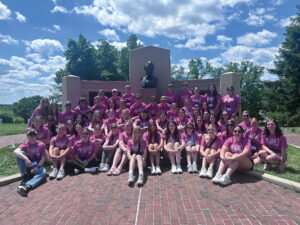Electric cooperative leaders advocated for rural Illinois on both the state and national level this spring during Electric Cooperative Lobby Day in Springfield on April 16 and the National Rural Electric Cooperative Association’s Legislative Conference April 21-24. During both events, electric co-op representatives met with elected officials to discuss legislation concerning electric cooperatives.
“It is necessary that electric cooperative leaders engage with elected officials to discuss the issues impacting our co-ops and their consumer-members,” said Nick Reitz, vice president of government relations at the Association of Illinois Electric Cooperatives (AIEC). “These events provide a great opportunity to advocate for our co-op priorities, share the impact of proposed legislation and tell our co-op story.”
Springfield

During Lobby Day at the Illinois State Capitol, more than 80 cooperative leaders representing 29 distribution and generation and transmission cooperatives visited with state senators and representatives to discuss their opposition to proposed legislation that would decrease member control and cost efficiency of the not-for-profit electric co-ops throughout Illinois.
Illinois’ electric cooperatives oppose House Bill 5315, which would force electric co-ops and municipal utilities to implement identical, unbalanced, one-size-fits-all solar net metering policies. It would take away the current local and transparent process, one which provides all local consumer-members a direct voice in utility decisions, and instead would give control to the Illinois Commerce Commission.
Co-ops have net metering policies in place that ensure residential and small commercial consumers who self-generate receive fair credits for excess generation. Co-op policies balance fairness in a cost-effective manner for their entire membership.
“We have a responsibility as not-for-profit cooperatives to prioritize fairness and financial stability,” Reitz said.

Illinois’ electric co-ops also oppose House Bill 5021 and Senate Bill 3637. If passed, these bills would significantly change a core principle of electric cooperatives — local control. This legislation would give oversight authority of cooperative power generation resources to the Illinois Power Agency and rate-setting authority for distributed generation to the Illinois Commerce Commission. These bills would strip away co-ops’ flexibility to economically plan for a long-term, sustainable future and ultimately increase rates for co-op consumer-members.
Washington, D.C.
More than 1,200 electric cooperative leaders gathered in Washington, D.C., including 40 representing Illinois electric cooperative consumer-members, to urge Congress to oppose the U.S. Environmental Protection Agency’s power plant rule and support full funding of U.S. Department of Agriculture (USDA) programs that benefit rural America.
Illinois electric co-op leaders met with staff members in the offices of several elected officials, including Senator Dick Durbin and U.S. Representatives Nikki Budzinski, Mike Bost, Eric Sorensen, Mary Miller, Darin LaHood and Raja Krishnamoorthi.
“Legislative Conference is a chance for Congress to hear directly from their co-op constituents,” said Hill Thomas, NRECA’s vice president of legislative affairs. “Because we are electric utility experts and have our finger on the pulse of rural communities, our members make very effective advocates.”









